Advanced Project Management Module Report: LTAF and Resit 2022-23
VerifiedAdded on 2023/02/13
|22
|8302
|35
Report
AI Summary
This document is a report on the Advanced Project Management module (RBP020L055A), covering key aspects of project management. The report begins with an introduction to project management, leadership, and team dynamics, emphasizing communication and cultural considerations in international projects. It then explores various project management methodologies like PRINCE2, PMBOK, and Agile, along with their practical applications. The report further delves into project planning, focusing on time, cost, and quality constraints, and the management of risks and uncertainties. It also includes insights on controlling and evaluating projects. The module utilizes case studies and interactive content to provide a comprehensive understanding of project management principles and their application in real-world scenarios, ensuring students can apply relevant tools and techniques to address challenges in complex projects.
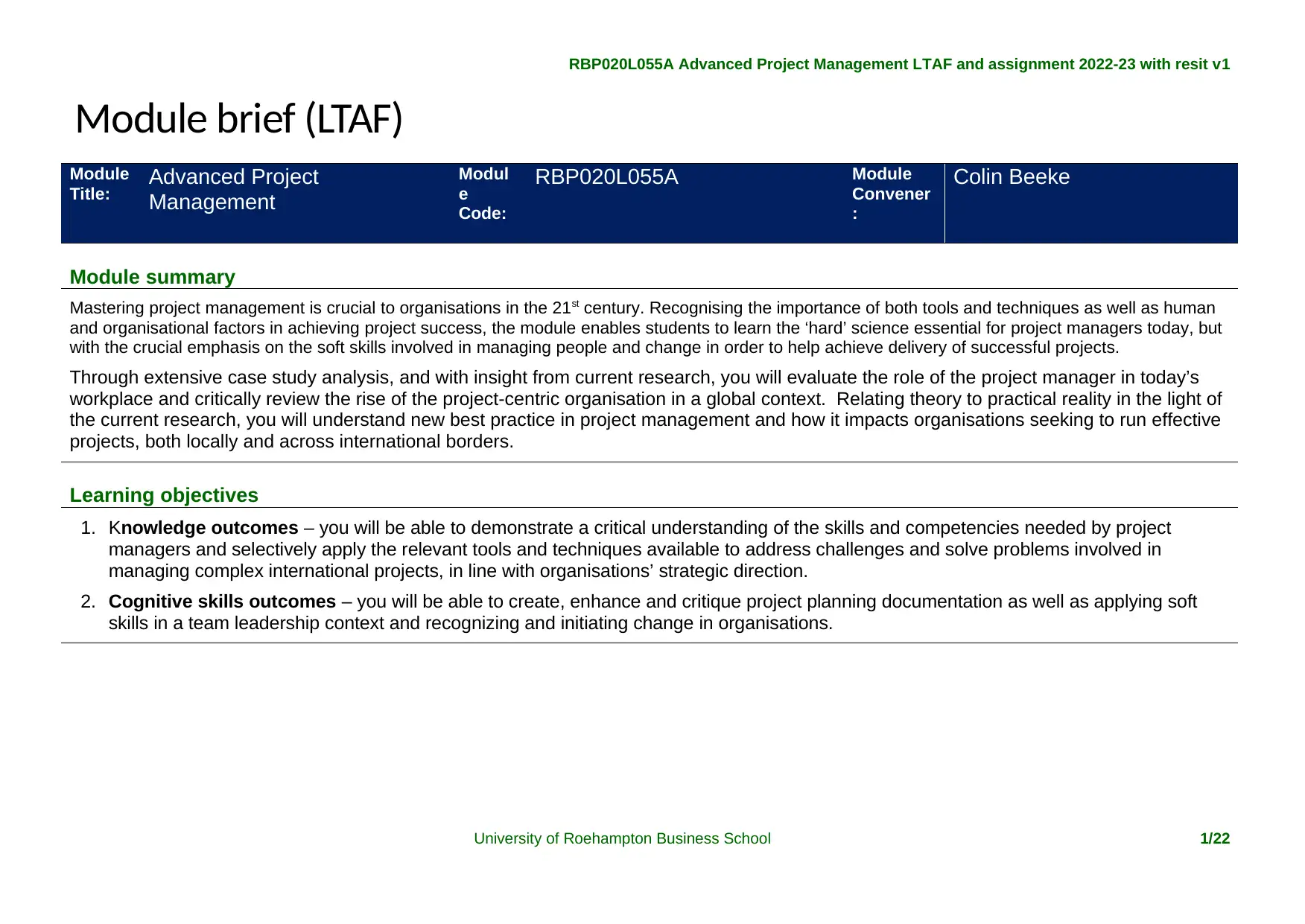
RBP020L055A Advanced Project Management LTAF and assignment 2022-23 with resit v1
Module brief (LTAF)
Module
Title: Advanced Project
Management
Modul
e
Code:
RBP020L055A Module
Convener
:
Colin Beeke
Module summary
Mastering project management is crucial to organisations in the 21st century. Recognising the importance of both tools and techniques as well as human
and organisational factors in achieving project success, the module enables students to learn the ‘hard’ science essential for project managers today, but
with the crucial emphasis on the soft skills involved in managing people and change in order to help achieve delivery of successful projects.
Through extensive case study analysis, and with insight from current research, you will evaluate the role of the project manager in today’s
workplace and critically review the rise of the project-centric organisation in a global context. Relating theory to practical reality in the light of
the current research, you will understand new best practice in project management and how it impacts organisations seeking to run effective
projects, both locally and across international borders.
Learning objectives
1. Knowledge outcomes – you will be able to demonstrate a critical understanding of the skills and competencies needed by project
managers and selectively apply the relevant tools and techniques available to address challenges and solve problems involved in
managing complex international projects, in line with organisations’ strategic direction.
2. Cognitive skills outcomes – you will be able to create, enhance and critique project planning documentation as well as applying soft
skills in a team leadership context and recognizing and initiating change in organisations.
University of Roehampton Business School 1/22
Module brief (LTAF)
Module
Title: Advanced Project
Management
Modul
e
Code:
RBP020L055A Module
Convener
:
Colin Beeke
Module summary
Mastering project management is crucial to organisations in the 21st century. Recognising the importance of both tools and techniques as well as human
and organisational factors in achieving project success, the module enables students to learn the ‘hard’ science essential for project managers today, but
with the crucial emphasis on the soft skills involved in managing people and change in order to help achieve delivery of successful projects.
Through extensive case study analysis, and with insight from current research, you will evaluate the role of the project manager in today’s
workplace and critically review the rise of the project-centric organisation in a global context. Relating theory to practical reality in the light of
the current research, you will understand new best practice in project management and how it impacts organisations seeking to run effective
projects, both locally and across international borders.
Learning objectives
1. Knowledge outcomes – you will be able to demonstrate a critical understanding of the skills and competencies needed by project
managers and selectively apply the relevant tools and techniques available to address challenges and solve problems involved in
managing complex international projects, in line with organisations’ strategic direction.
2. Cognitive skills outcomes – you will be able to create, enhance and critique project planning documentation as well as applying soft
skills in a team leadership context and recognizing and initiating change in organisations.
University of Roehampton Business School 1/22
Paraphrase This Document
Need a fresh take? Get an instant paraphrase of this document with our AI Paraphraser
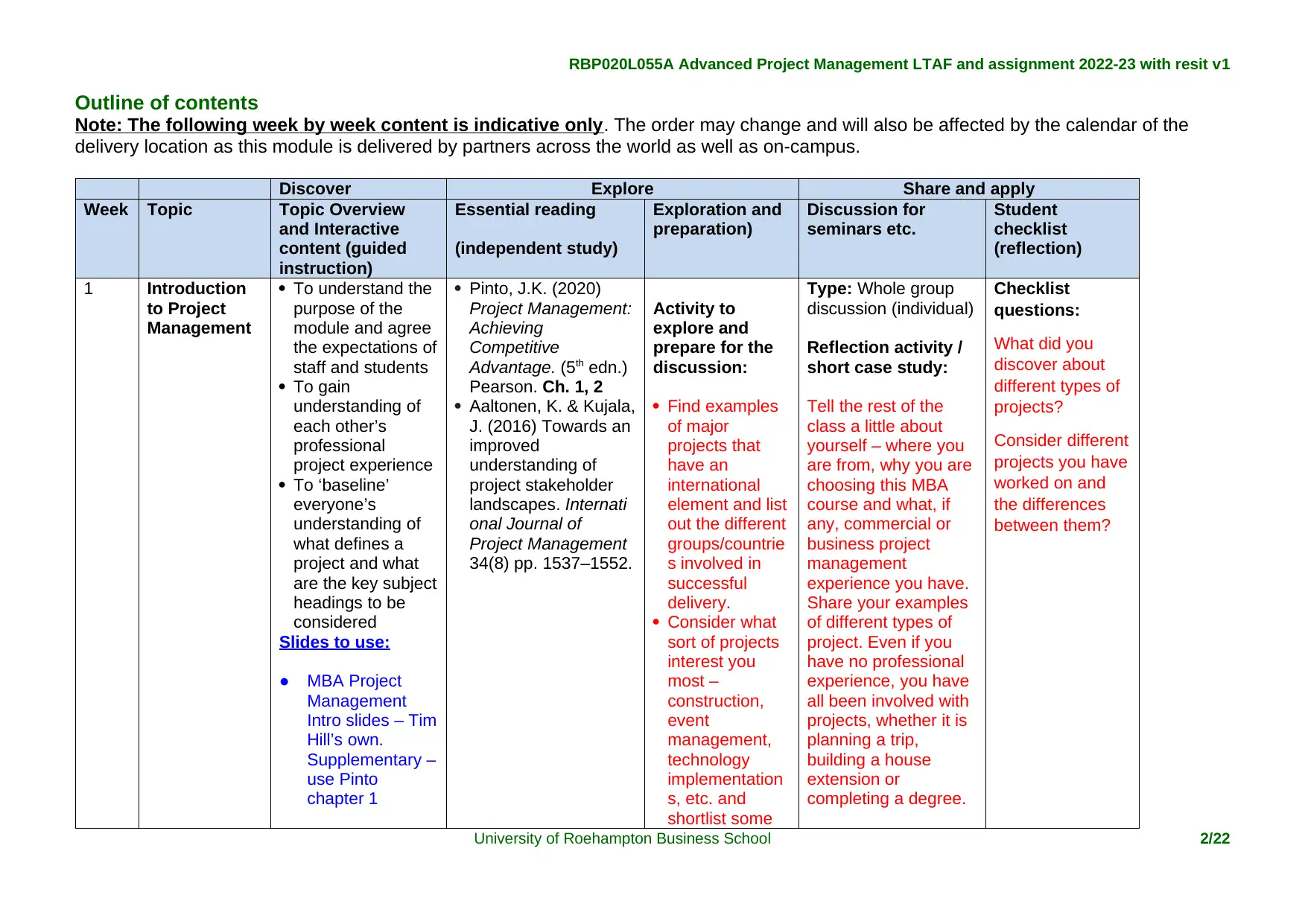
RBP020L055A Advanced Project Management LTAF and assignment 2022-23 with resit v1
Outline of contents
Note: The following week by week content is indicative only. The order may change and will also be affected by the calendar of the
delivery location as this module is delivered by partners across the world as well as on-campus.
Discover Explore Share and apply
Week Topic Topic Overview
and Interactive
content (guided
instruction)
Essential reading
(independent study)
Exploration and
preparation)
Discussion for
seminars etc.
Student
checklist
(reflection)
1 Introduction
to Project
Management
To understand the
purpose of the
module and agree
the expectations of
staff and students
To gain
understanding of
each other’s
professional
project experience
To ‘baseline’
everyone’s
understanding of
what defines a
project and what
are the key subject
headings to be
considered
Slides to use:
● MBA Project
Management
Intro slides – Tim
Hill’s own.
Supplementary –
use Pinto
chapter 1
Pinto, J.K. (2020)
Project Management:
Achieving
Competitive
Advantage. (5th edn.)
Pearson. Ch. 1, 2
Aaltonen, K. & Kujala,
J. (2016) Towards an
improved
understanding of
project stakeholder
landscapes. Internati
onal Journal of
Project Management
34(8) pp. 1537–1552.
Activity to
explore and
prepare for the
discussion:
Find examples
of major
projects that
have an
international
element and list
out the different
groups/countrie
s involved in
successful
delivery.
Consider what
sort of projects
interest you
most –
construction,
event
management,
technology
implementation
s, etc. and
shortlist some
Type: Whole group
discussion (individual)
Reflection activity /
short case study:
Tell the rest of the
class a little about
yourself – where you
are from, why you are
choosing this MBA
course and what, if
any, commercial or
business project
management
experience you have.
Share your examples
of different types of
project. Even if you
have no professional
experience, you have
all been involved with
projects, whether it is
planning a trip,
building a house
extension or
completing a degree.
Checklist
questions:
What did you
discover about
different types of
projects?
Consider different
projects you have
worked on and
the differences
between them?
University of Roehampton Business School 2/22
Outline of contents
Note: The following week by week content is indicative only. The order may change and will also be affected by the calendar of the
delivery location as this module is delivered by partners across the world as well as on-campus.
Discover Explore Share and apply
Week Topic Topic Overview
and Interactive
content (guided
instruction)
Essential reading
(independent study)
Exploration and
preparation)
Discussion for
seminars etc.
Student
checklist
(reflection)
1 Introduction
to Project
Management
To understand the
purpose of the
module and agree
the expectations of
staff and students
To gain
understanding of
each other’s
professional
project experience
To ‘baseline’
everyone’s
understanding of
what defines a
project and what
are the key subject
headings to be
considered
Slides to use:
● MBA Project
Management
Intro slides – Tim
Hill’s own.
Supplementary –
use Pinto
chapter 1
Pinto, J.K. (2020)
Project Management:
Achieving
Competitive
Advantage. (5th edn.)
Pearson. Ch. 1, 2
Aaltonen, K. & Kujala,
J. (2016) Towards an
improved
understanding of
project stakeholder
landscapes. Internati
onal Journal of
Project Management
34(8) pp. 1537–1552.
Activity to
explore and
prepare for the
discussion:
Find examples
of major
projects that
have an
international
element and list
out the different
groups/countrie
s involved in
successful
delivery.
Consider what
sort of projects
interest you
most –
construction,
event
management,
technology
implementation
s, etc. and
shortlist some
Type: Whole group
discussion (individual)
Reflection activity /
short case study:
Tell the rest of the
class a little about
yourself – where you
are from, why you are
choosing this MBA
course and what, if
any, commercial or
business project
management
experience you have.
Share your examples
of different types of
project. Even if you
have no professional
experience, you have
all been involved with
projects, whether it is
planning a trip,
building a house
extension or
completing a degree.
Checklist
questions:
What did you
discover about
different types of
projects?
Consider different
projects you have
worked on and
the differences
between them?
University of Roehampton Business School 2/22
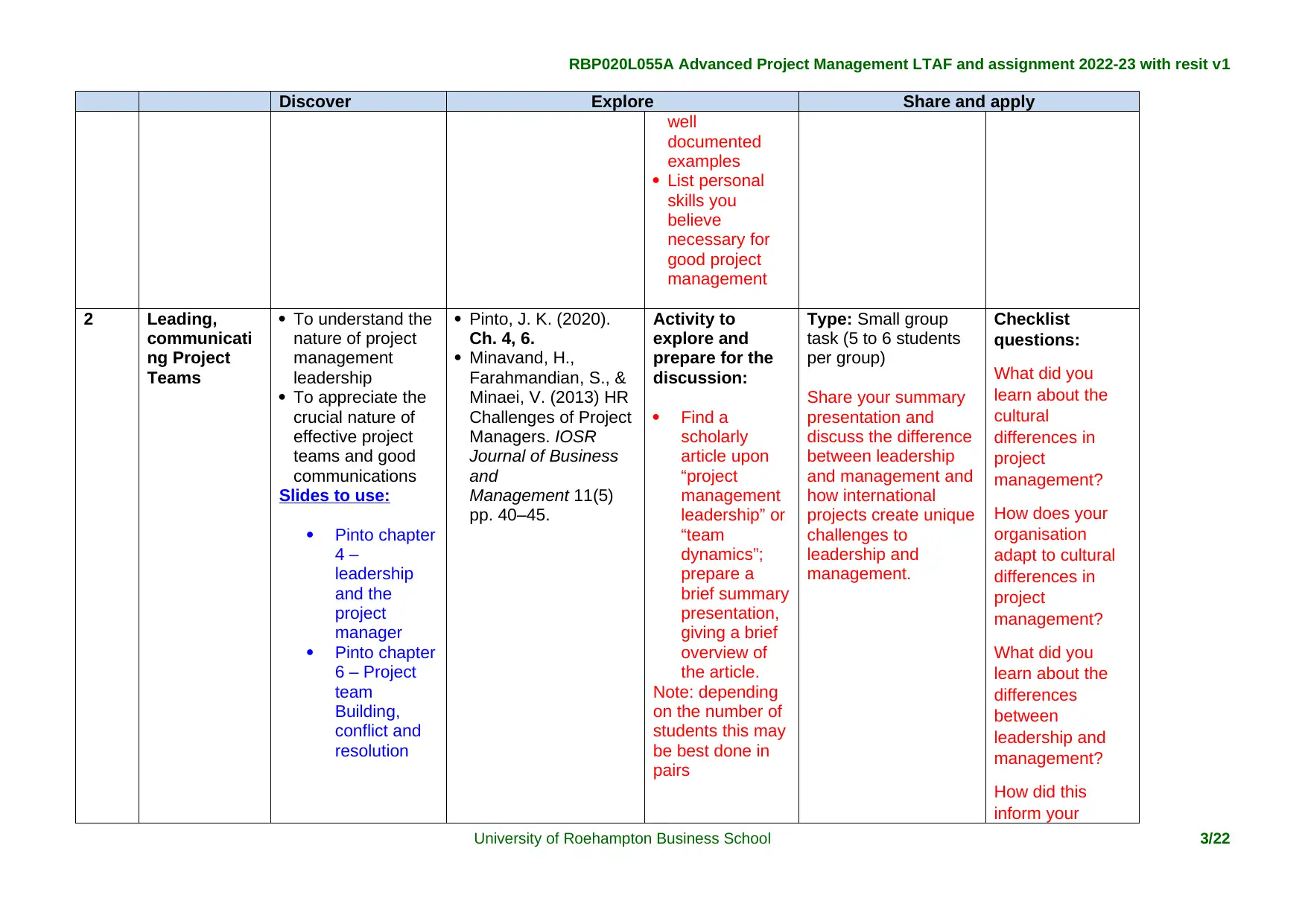
RBP020L055A Advanced Project Management LTAF and assignment 2022-23 with resit v1
Discover Explore Share and apply
well
documented
examples
List personal
skills you
believe
necessary for
good project
management
2 Leading,
communicati
ng Project
Teams
To understand the
nature of project
management
leadership
To appreciate the
crucial nature of
effective project
teams and good
communications
Slides to use:
Pinto chapter
4 –
leadership
and the
project
manager
Pinto chapter
6 – Project
team
Building,
conflict and
resolution
Pinto, J. K. (2020).
Ch. 4, 6.
Minavand, H.,
Farahmandian, S., &
Minaei, V. (2013) HR
Challenges of Project
Managers. IOSR
Journal of Business
and
Management 11(5)
pp. 40–45.
Activity to
explore and
prepare for the
discussion:
Find a
scholarly
article upon
“project
management
leadership” or
“team
dynamics”;
prepare a
brief summary
presentation,
giving a brief
overview of
the article.
Note: depending
on the number of
students this may
be best done in
pairs
Type: Small group
task (5 to 6 students
per group)
Share your summary
presentation and
discuss the difference
between leadership
and management and
how international
projects create unique
challenges to
leadership and
management.
Checklist
questions:
What did you
learn about the
cultural
differences in
project
management?
How does your
organisation
adapt to cultural
differences in
project
management?
What did you
learn about the
differences
between
leadership and
management?
How did this
inform your
University of Roehampton Business School 3/22
Discover Explore Share and apply
well
documented
examples
List personal
skills you
believe
necessary for
good project
management
2 Leading,
communicati
ng Project
Teams
To understand the
nature of project
management
leadership
To appreciate the
crucial nature of
effective project
teams and good
communications
Slides to use:
Pinto chapter
4 –
leadership
and the
project
manager
Pinto chapter
6 – Project
team
Building,
conflict and
resolution
Pinto, J. K. (2020).
Ch. 4, 6.
Minavand, H.,
Farahmandian, S., &
Minaei, V. (2013) HR
Challenges of Project
Managers. IOSR
Journal of Business
and
Management 11(5)
pp. 40–45.
Activity to
explore and
prepare for the
discussion:
Find a
scholarly
article upon
“project
management
leadership” or
“team
dynamics”;
prepare a
brief summary
presentation,
giving a brief
overview of
the article.
Note: depending
on the number of
students this may
be best done in
pairs
Type: Small group
task (5 to 6 students
per group)
Share your summary
presentation and
discuss the difference
between leadership
and management and
how international
projects create unique
challenges to
leadership and
management.
Checklist
questions:
What did you
learn about the
cultural
differences in
project
management?
How does your
organisation
adapt to cultural
differences in
project
management?
What did you
learn about the
differences
between
leadership and
management?
How did this
inform your
University of Roehampton Business School 3/22
⊘ This is a preview!⊘
Do you want full access?
Subscribe today to unlock all pages.

Trusted by 1+ million students worldwide
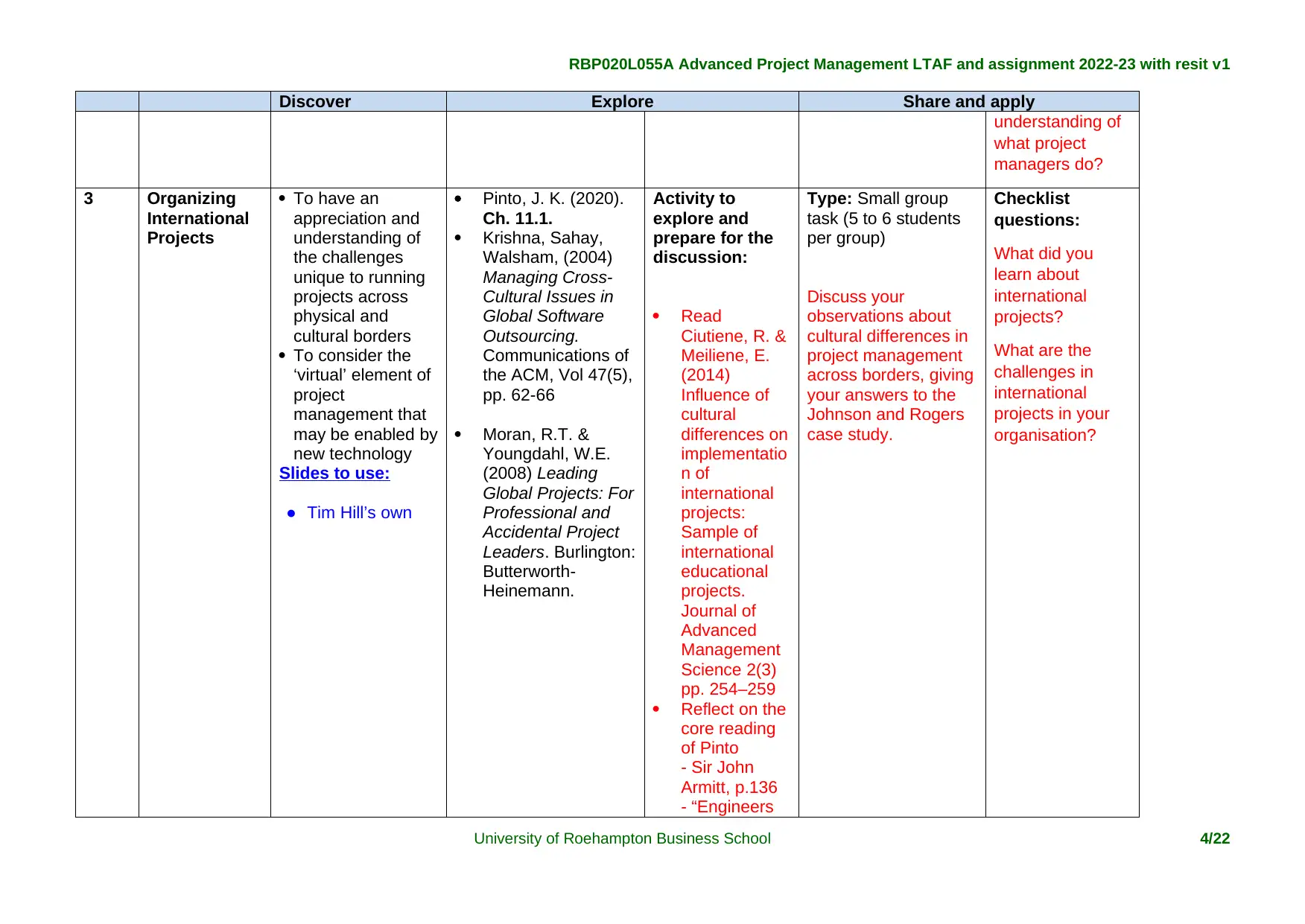
RBP020L055A Advanced Project Management LTAF and assignment 2022-23 with resit v1
Discover Explore Share and apply
understanding of
what project
managers do?
3 Organizing
International
Projects
To have an
appreciation and
understanding of
the challenges
unique to running
projects across
physical and
cultural borders
To consider the
‘virtual’ element of
project
management that
may be enabled by
new technology
Slides to use:
● Tim Hill’s own
Pinto, J. K. (2020).
Ch. 11.1.
Krishna, Sahay,
Walsham, (2004)
Managing Cross-
Cultural Issues in
Global Software
Outsourcing.
Communications of
the ACM, Vol 47(5),
pp. 62-66
Moran, R.T. &
Youngdahl, W.E.
(2008) Leading
Global Projects: For
Professional and
Accidental Project
Leaders. Burlington:
Butterworth-
Heinemann.
Activity to
explore and
prepare for the
discussion:
Read
Ciutiene, R. &
Meiliene, E.
(2014)
Influence of
cultural
differences on
implementatio
n of
international
projects:
Sample of
international
educational
projects.
Journal of
Advanced
Management
Science 2(3)
pp. 254–259
Reflect on the
core reading
of Pinto
- Sir John
Armitt, p.136
- “Engineers
Type: Small group
task (5 to 6 students
per group)
Discuss your
observations about
cultural differences in
project management
across borders, giving
your answers to the
Johnson and Rogers
case study.
Checklist
questions:
What did you
learn about
international
projects?
What are the
challenges in
international
projects in your
organisation?
University of Roehampton Business School 4/22
Discover Explore Share and apply
understanding of
what project
managers do?
3 Organizing
International
Projects
To have an
appreciation and
understanding of
the challenges
unique to running
projects across
physical and
cultural borders
To consider the
‘virtual’ element of
project
management that
may be enabled by
new technology
Slides to use:
● Tim Hill’s own
Pinto, J. K. (2020).
Ch. 11.1.
Krishna, Sahay,
Walsham, (2004)
Managing Cross-
Cultural Issues in
Global Software
Outsourcing.
Communications of
the ACM, Vol 47(5),
pp. 62-66
Moran, R.T. &
Youngdahl, W.E.
(2008) Leading
Global Projects: For
Professional and
Accidental Project
Leaders. Burlington:
Butterworth-
Heinemann.
Activity to
explore and
prepare for the
discussion:
Read
Ciutiene, R. &
Meiliene, E.
(2014)
Influence of
cultural
differences on
implementatio
n of
international
projects:
Sample of
international
educational
projects.
Journal of
Advanced
Management
Science 2(3)
pp. 254–259
Reflect on the
core reading
of Pinto
- Sir John
Armitt, p.136
- “Engineers
Type: Small group
task (5 to 6 students
per group)
Discuss your
observations about
cultural differences in
project management
across borders, giving
your answers to the
Johnson and Rogers
case study.
Checklist
questions:
What did you
learn about
international
projects?
What are the
challenges in
international
projects in your
organisation?
University of Roehampton Business School 4/22
Paraphrase This Document
Need a fresh take? Get an instant paraphrase of this document with our AI Paraphraser
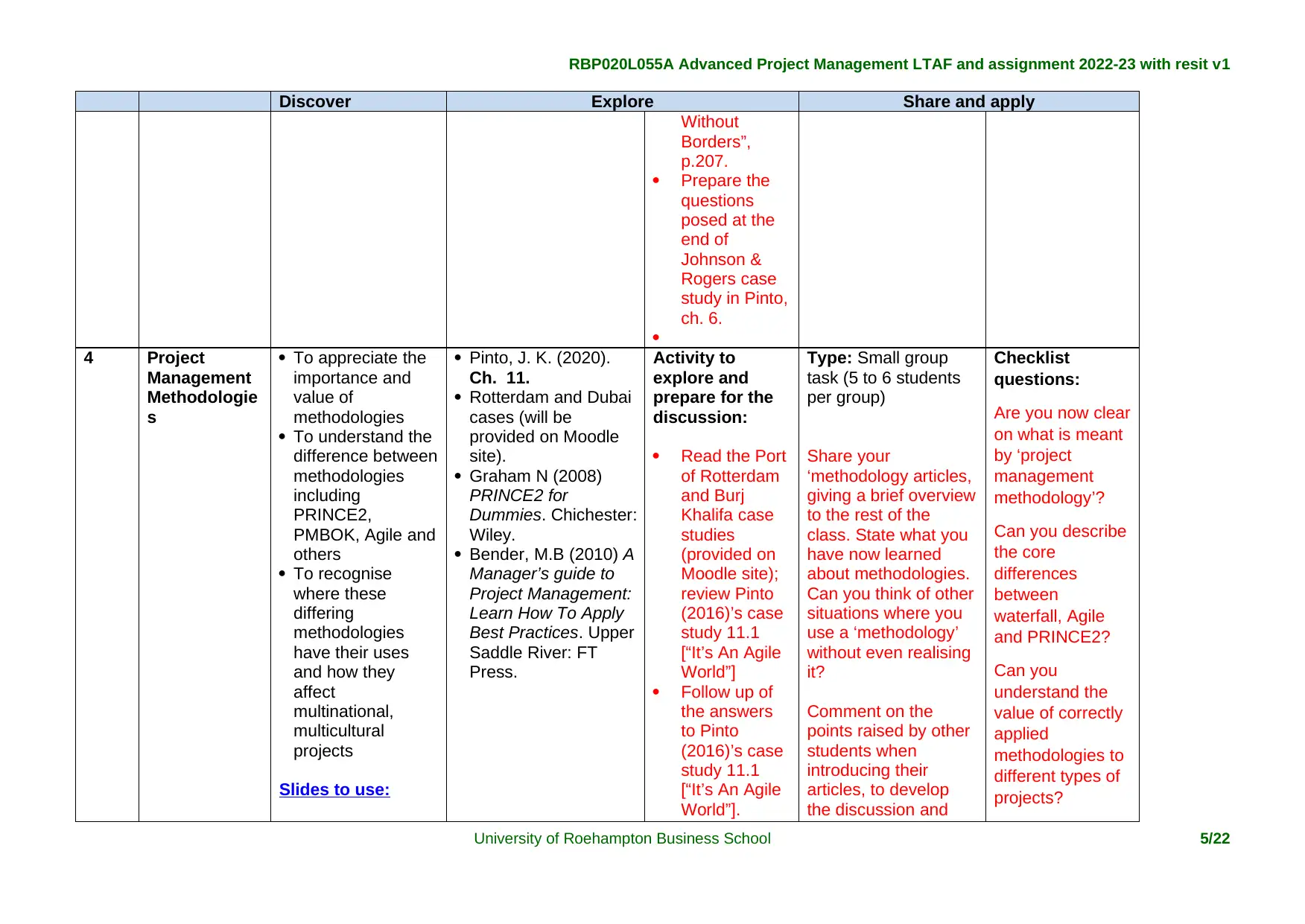
RBP020L055A Advanced Project Management LTAF and assignment 2022-23 with resit v1
Discover Explore Share and apply
Without
Borders”,
p.207.
Prepare the
questions
posed at the
end of
Johnson &
Rogers case
study in Pinto,
ch. 6.
4 Project
Management
Methodologie
s
To appreciate the
importance and
value of
methodologies
To understand the
difference between
methodologies
including
PRINCE2,
PMBOK, Agile and
others
To recognise
where these
differing
methodologies
have their uses
and how they
affect
multinational,
multicultural
projects
Slides to use:
Pinto, J. K. (2020).
Ch. 11.
Rotterdam and Dubai
cases (will be
provided on Moodle
site).
Graham N (2008)
PRINCE2 for
Dummies. Chichester:
Wiley.
Bender, M.B (2010) A
Manager’s guide to
Project Management:
Learn How To Apply
Best Practices. Upper
Saddle River: FT
Press.
Activity to
explore and
prepare for the
discussion:
Read the Port
of Rotterdam
and Burj
Khalifa case
studies
(provided on
Moodle site);
review Pinto
(2016)’s case
study 11.1
[“It’s An Agile
World”]
Follow up of
the answers
to Pinto
(2016)’s case
study 11.1
[“It’s An Agile
World”].
Type: Small group
task (5 to 6 students
per group)
Share your
‘methodology articles,
giving a brief overview
to the rest of the
class. State what you
have now learned
about methodologies.
Can you think of other
situations where you
use a ‘methodology’
without even realising
it?
Comment on the
points raised by other
students when
introducing their
articles, to develop
the discussion and
Checklist
questions:
Are you now clear
on what is meant
by ‘project
management
methodology’?
Can you describe
the core
differences
between
waterfall, Agile
and PRINCE2?
Can you
understand the
value of correctly
applied
methodologies to
different types of
projects?
University of Roehampton Business School 5/22
Discover Explore Share and apply
Without
Borders”,
p.207.
Prepare the
questions
posed at the
end of
Johnson &
Rogers case
study in Pinto,
ch. 6.
4 Project
Management
Methodologie
s
To appreciate the
importance and
value of
methodologies
To understand the
difference between
methodologies
including
PRINCE2,
PMBOK, Agile and
others
To recognise
where these
differing
methodologies
have their uses
and how they
affect
multinational,
multicultural
projects
Slides to use:
Pinto, J. K. (2020).
Ch. 11.
Rotterdam and Dubai
cases (will be
provided on Moodle
site).
Graham N (2008)
PRINCE2 for
Dummies. Chichester:
Wiley.
Bender, M.B (2010) A
Manager’s guide to
Project Management:
Learn How To Apply
Best Practices. Upper
Saddle River: FT
Press.
Activity to
explore and
prepare for the
discussion:
Read the Port
of Rotterdam
and Burj
Khalifa case
studies
(provided on
Moodle site);
review Pinto
(2016)’s case
study 11.1
[“It’s An Agile
World”]
Follow up of
the answers
to Pinto
(2016)’s case
study 11.1
[“It’s An Agile
World”].
Type: Small group
task (5 to 6 students
per group)
Share your
‘methodology articles,
giving a brief overview
to the rest of the
class. State what you
have now learned
about methodologies.
Can you think of other
situations where you
use a ‘methodology’
without even realising
it?
Comment on the
points raised by other
students when
introducing their
articles, to develop
the discussion and
Checklist
questions:
Are you now clear
on what is meant
by ‘project
management
methodology’?
Can you describe
the core
differences
between
waterfall, Agile
and PRINCE2?
Can you
understand the
value of correctly
applied
methodologies to
different types of
projects?
University of Roehampton Business School 5/22
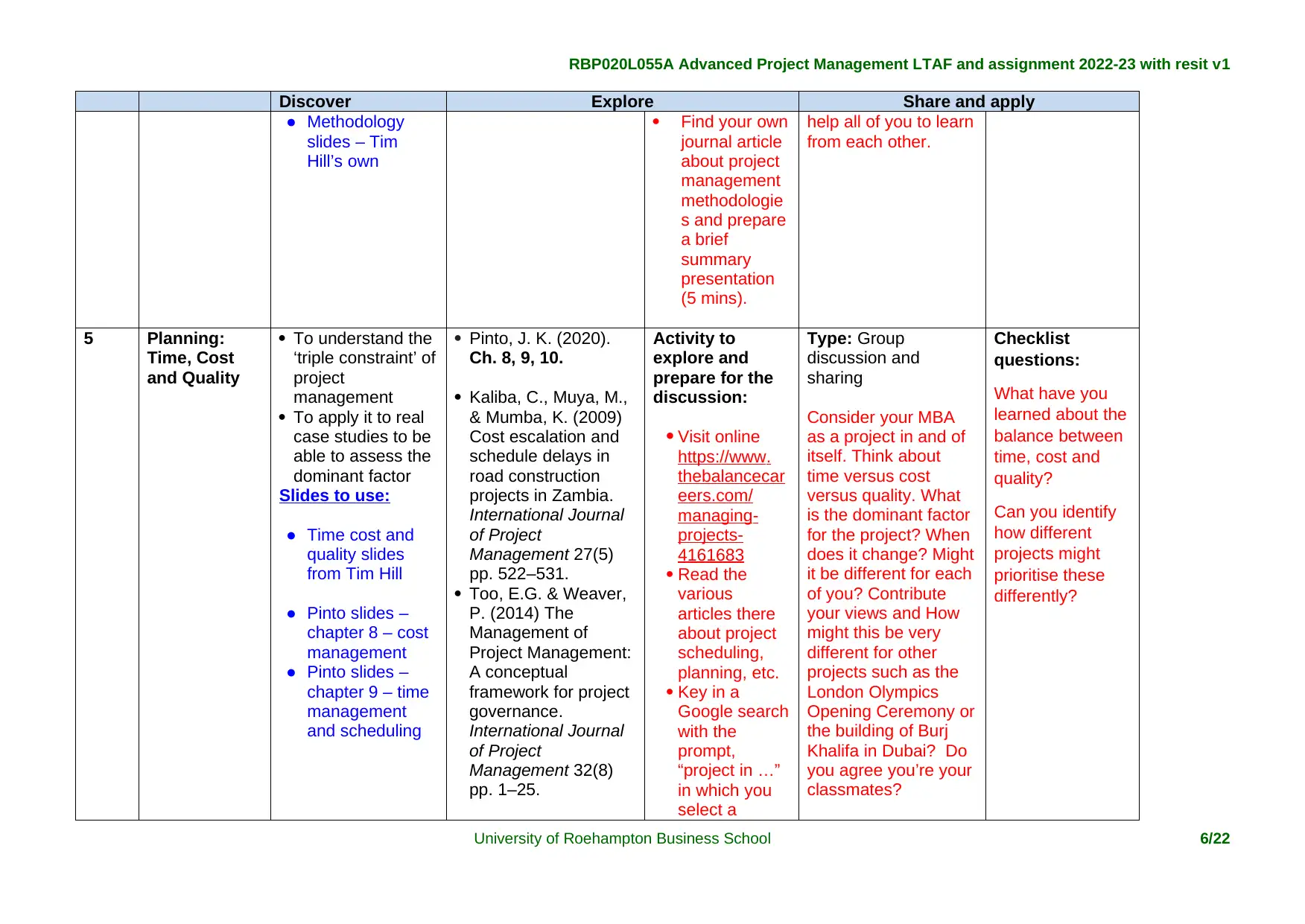
RBP020L055A Advanced Project Management LTAF and assignment 2022-23 with resit v1
Discover Explore Share and apply
● Methodology
slides – Tim
Hill’s own
Find your own
journal article
about project
management
methodologie
s and prepare
a brief
summary
presentation
(5 mins).
help all of you to learn
from each other.
5 Planning:
Time, Cost
and Quality
To understand the
‘triple constraint’ of
project
management
To apply it to real
case studies to be
able to assess the
dominant factor
Slides to use:
● Time cost and
quality slides
from Tim Hill
● Pinto slides –
chapter 8 – cost
management
● Pinto slides –
chapter 9 – time
management
and scheduling
Pinto, J. K. (2020).
Ch. 8, 9, 10.
Kaliba, C., Muya, M.,
& Mumba, K. (2009)
Cost escalation and
schedule delays in
road construction
projects in Zambia.
International Journal
of Project
Management 27(5)
pp. 522–531.
Too, E.G. & Weaver,
P. (2014) The
Management of
Project Management:
A conceptual
framework for project
governance.
International Journal
of Project
Management 32(8)
pp. 1–25.
Activity to
explore and
prepare for the
discussion:
Visit online
https://www.
thebalancecar
eers.com/
managing-
projects-
4161683
Read the
various
articles there
about project
scheduling,
planning, etc.
Key in a
Google search
with the
prompt,
“project in …”
in which you
select a
Type: Group
discussion and
sharing
Consider your MBA
as a project in and of
itself. Think about
time versus cost
versus quality. What
is the dominant factor
for the project? When
does it change? Might
it be different for each
of you? Contribute
your views and How
might this be very
different for other
projects such as the
London Olympics
Opening Ceremony or
the building of Burj
Khalifa in Dubai? Do
you agree you’re your
classmates?
Checklist
questions:
What have you
learned about the
balance between
time, cost and
quality?
Can you identify
how different
projects might
prioritise these
differently?
University of Roehampton Business School 6/22
Discover Explore Share and apply
● Methodology
slides – Tim
Hill’s own
Find your own
journal article
about project
management
methodologie
s and prepare
a brief
summary
presentation
(5 mins).
help all of you to learn
from each other.
5 Planning:
Time, Cost
and Quality
To understand the
‘triple constraint’ of
project
management
To apply it to real
case studies to be
able to assess the
dominant factor
Slides to use:
● Time cost and
quality slides
from Tim Hill
● Pinto slides –
chapter 8 – cost
management
● Pinto slides –
chapter 9 – time
management
and scheduling
Pinto, J. K. (2020).
Ch. 8, 9, 10.
Kaliba, C., Muya, M.,
& Mumba, K. (2009)
Cost escalation and
schedule delays in
road construction
projects in Zambia.
International Journal
of Project
Management 27(5)
pp. 522–531.
Too, E.G. & Weaver,
P. (2014) The
Management of
Project Management:
A conceptual
framework for project
governance.
International Journal
of Project
Management 32(8)
pp. 1–25.
Activity to
explore and
prepare for the
discussion:
Visit online
https://www.
thebalancecar
eers.com/
managing-
projects-
4161683
Read the
various
articles there
about project
scheduling,
planning, etc.
Key in a
Google search
with the
prompt,
“project in …”
in which you
select a
Type: Group
discussion and
sharing
Consider your MBA
as a project in and of
itself. Think about
time versus cost
versus quality. What
is the dominant factor
for the project? When
does it change? Might
it be different for each
of you? Contribute
your views and How
might this be very
different for other
projects such as the
London Olympics
Opening Ceremony or
the building of Burj
Khalifa in Dubai? Do
you agree you’re your
classmates?
Checklist
questions:
What have you
learned about the
balance between
time, cost and
quality?
Can you identify
how different
projects might
prioritise these
differently?
University of Roehampton Business School 6/22
⊘ This is a preview!⊘
Do you want full access?
Subscribe today to unlock all pages.

Trusted by 1+ million students worldwide
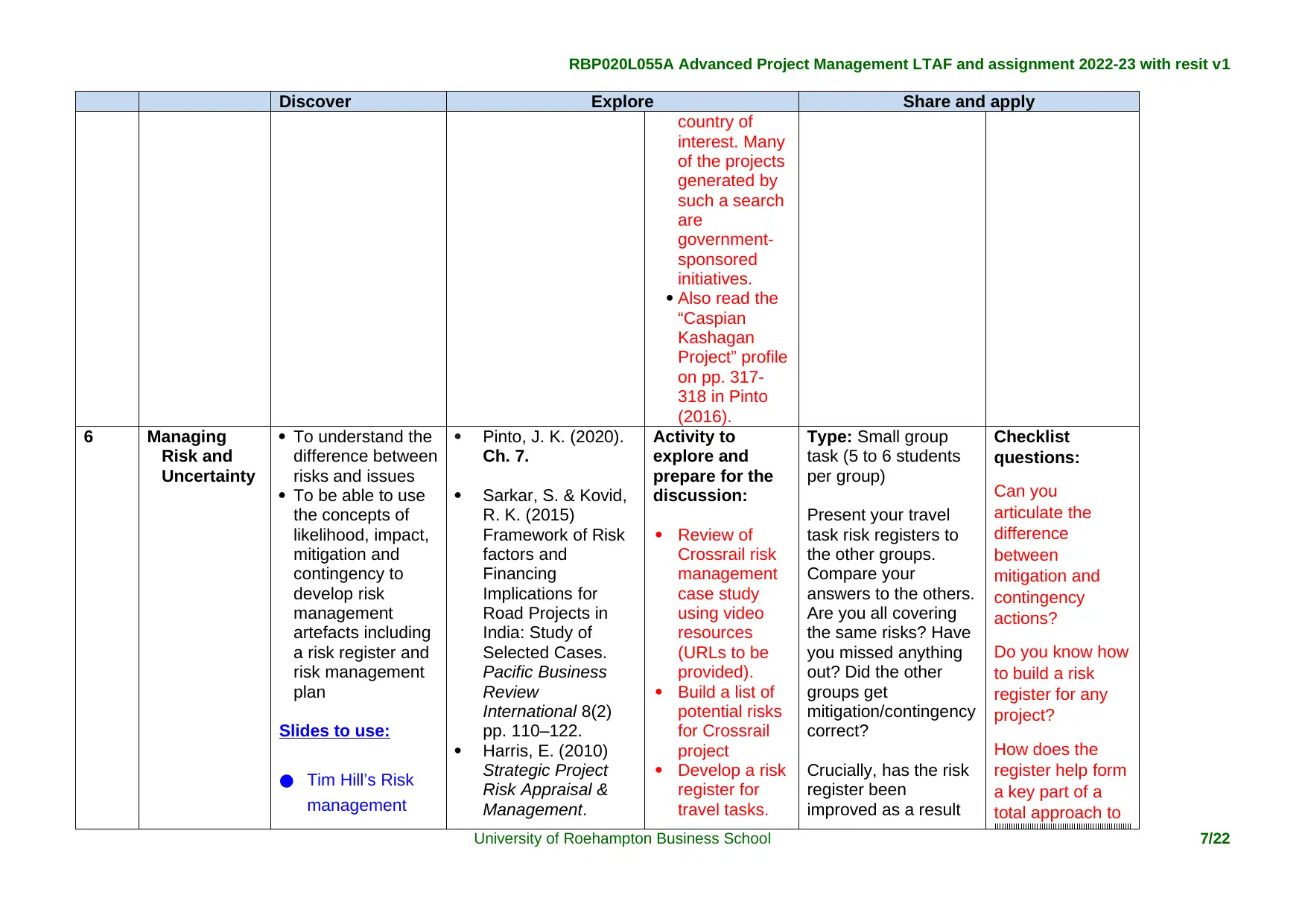
RBP020L055A Advanced Project Management LTAF and assignment 2022-23 with resit v1
Discover Explore Share and apply
country of
interest. Many
of the projects
generated by
such a search
are
government-
sponsored
initiatives.
Also read the
“Caspian
Kashagan
Project” profile
on pp. 317-
318 in Pinto
(2016).
6 Managing
Risk and
Uncertainty
To understand the
difference between
risks and issues
To be able to use
the concepts of
likelihood, impact,
mitigation and
contingency to
develop risk
management
artefacts including
a risk register and
risk management
plan
Slides to use:
● Tim Hill’s Risk
management
Pinto, J. K. (2020).
Ch. 7.
Sarkar, S. & Kovid,
R. K. (2015)
Framework of Risk
factors and
Financing
Implications for
Road Projects in
India: Study of
Selected Cases.
Pacific Business
Review
International 8(2)
pp. 110–122.
Harris, E. (2010)
Strategic Project
Risk Appraisal &
Management.
Activity to
explore and
prepare for the
discussion:
Review of
Crossrail risk
management
case study
using video
resources
(URLs to be
provided).
Build a list of
potential risks
for Crossrail
project
Develop a risk
register for
travel tasks.
Type: Small group
task (5 to 6 students
per group)
Present your travel
task risk registers to
the other groups.
Compare your
answers to the others.
Are you all covering
the same risks? Have
you missed anything
out? Did the other
groups get
mitigation/contingency
correct?
Crucially, has the risk
register been
improved as a result
Checklist
questions:
Can you
articulate the
difference
between
mitigation and
contingency
actions?
Do you know how
to build a risk
register for any
project?
How does the
register help form
a key part of a
total approach to
University of Roehampton Business School 7/22
Discover Explore Share and apply
country of
interest. Many
of the projects
generated by
such a search
are
government-
sponsored
initiatives.
Also read the
“Caspian
Kashagan
Project” profile
on pp. 317-
318 in Pinto
(2016).
6 Managing
Risk and
Uncertainty
To understand the
difference between
risks and issues
To be able to use
the concepts of
likelihood, impact,
mitigation and
contingency to
develop risk
management
artefacts including
a risk register and
risk management
plan
Slides to use:
● Tim Hill’s Risk
management
Pinto, J. K. (2020).
Ch. 7.
Sarkar, S. & Kovid,
R. K. (2015)
Framework of Risk
factors and
Financing
Implications for
Road Projects in
India: Study of
Selected Cases.
Pacific Business
Review
International 8(2)
pp. 110–122.
Harris, E. (2010)
Strategic Project
Risk Appraisal &
Management.
Activity to
explore and
prepare for the
discussion:
Review of
Crossrail risk
management
case study
using video
resources
(URLs to be
provided).
Build a list of
potential risks
for Crossrail
project
Develop a risk
register for
travel tasks.
Type: Small group
task (5 to 6 students
per group)
Present your travel
task risk registers to
the other groups.
Compare your
answers to the others.
Are you all covering
the same risks? Have
you missed anything
out? Did the other
groups get
mitigation/contingency
correct?
Crucially, has the risk
register been
improved as a result
Checklist
questions:
Can you
articulate the
difference
between
mitigation and
contingency
actions?
Do you know how
to build a risk
register for any
project?
How does the
register help form
a key part of a
total approach to
University of Roehampton Business School 7/22
Paraphrase This Document
Need a fresh take? Get an instant paraphrase of this document with our AI Paraphraser
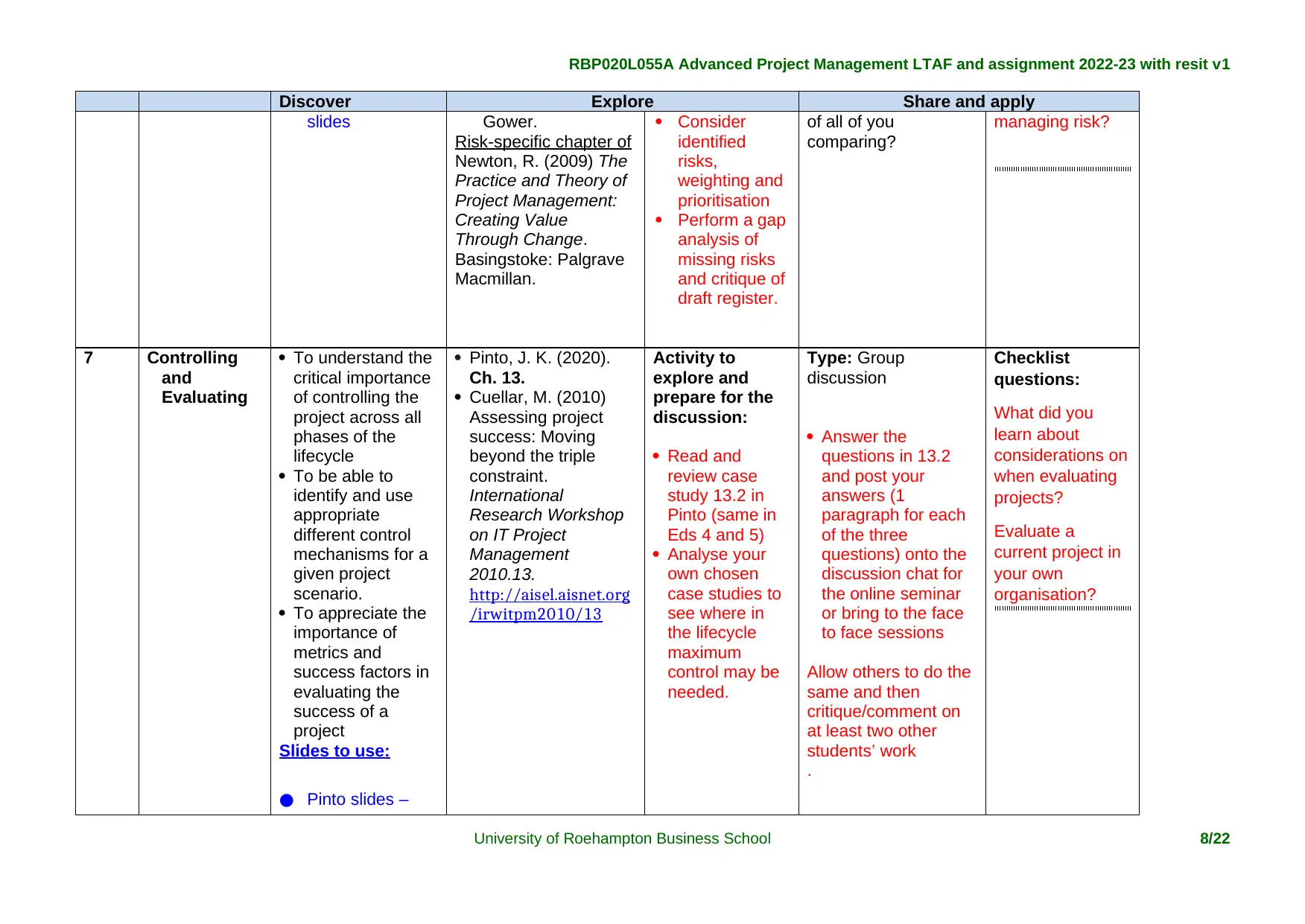
RBP020L055A Advanced Project Management LTAF and assignment 2022-23 with resit v1
Discover Explore Share and apply
slides Gower.
Risk-specific chapter of
Newton, R. (2009) The
Practice and Theory of
Project Management:
Creating Value
Through Change.
Basingstoke: Palgrave
Macmillan.
Consider
identified
risks,
weighting and
prioritisation
Perform a gap
analysis of
missing risks
and critique of
draft register.
of all of you
comparing?
managing risk?
7 Controlling
and
Evaluating
To understand the
critical importance
of controlling the
project across all
phases of the
lifecycle
To be able to
identify and use
appropriate
different control
mechanisms for a
given project
scenario.
To appreciate the
importance of
metrics and
success factors in
evaluating the
success of a
project
Slides to use:
● Pinto slides –
Pinto, J. K. (2020).
Ch. 13.
Cuellar, M. (2010)
Assessing project
success: Moving
beyond the triple
constraint.
International
Research Workshop
on IT Project
Management
2010.13.
http://aisel.aisnet.org
/irwitpm2010/13
Activity to
explore and
prepare for the
discussion:
Read and
review case
study 13.2 in
Pinto (same in
Eds 4 and 5)
Analyse your
own chosen
case studies to
see where in
the lifecycle
maximum
control may be
needed.
Type: Group
discussion
Answer the
questions in 13.2
and post your
answers (1
paragraph for each
of the three
questions) onto the
discussion chat for
the online seminar
or bring to the face
to face sessions
Allow others to do the
same and then
critique/comment on
at least two other
students’ work
.
Checklist
questions:
What did you
learn about
considerations on
when evaluating
projects?
Evaluate a
current project in
your own
organisation?
University of Roehampton Business School 8/22
Discover Explore Share and apply
slides Gower.
Risk-specific chapter of
Newton, R. (2009) The
Practice and Theory of
Project Management:
Creating Value
Through Change.
Basingstoke: Palgrave
Macmillan.
Consider
identified
risks,
weighting and
prioritisation
Perform a gap
analysis of
missing risks
and critique of
draft register.
of all of you
comparing?
managing risk?
7 Controlling
and
Evaluating
To understand the
critical importance
of controlling the
project across all
phases of the
lifecycle
To be able to
identify and use
appropriate
different control
mechanisms for a
given project
scenario.
To appreciate the
importance of
metrics and
success factors in
evaluating the
success of a
project
Slides to use:
● Pinto slides –
Pinto, J. K. (2020).
Ch. 13.
Cuellar, M. (2010)
Assessing project
success: Moving
beyond the triple
constraint.
International
Research Workshop
on IT Project
Management
2010.13.
http://aisel.aisnet.org
/irwitpm2010/13
Activity to
explore and
prepare for the
discussion:
Read and
review case
study 13.2 in
Pinto (same in
Eds 4 and 5)
Analyse your
own chosen
case studies to
see where in
the lifecycle
maximum
control may be
needed.
Type: Group
discussion
Answer the
questions in 13.2
and post your
answers (1
paragraph for each
of the three
questions) onto the
discussion chat for
the online seminar
or bring to the face
to face sessions
Allow others to do the
same and then
critique/comment on
at least two other
students’ work
.
Checklist
questions:
What did you
learn about
considerations on
when evaluating
projects?
Evaluate a
current project in
your own
organisation?
University of Roehampton Business School 8/22
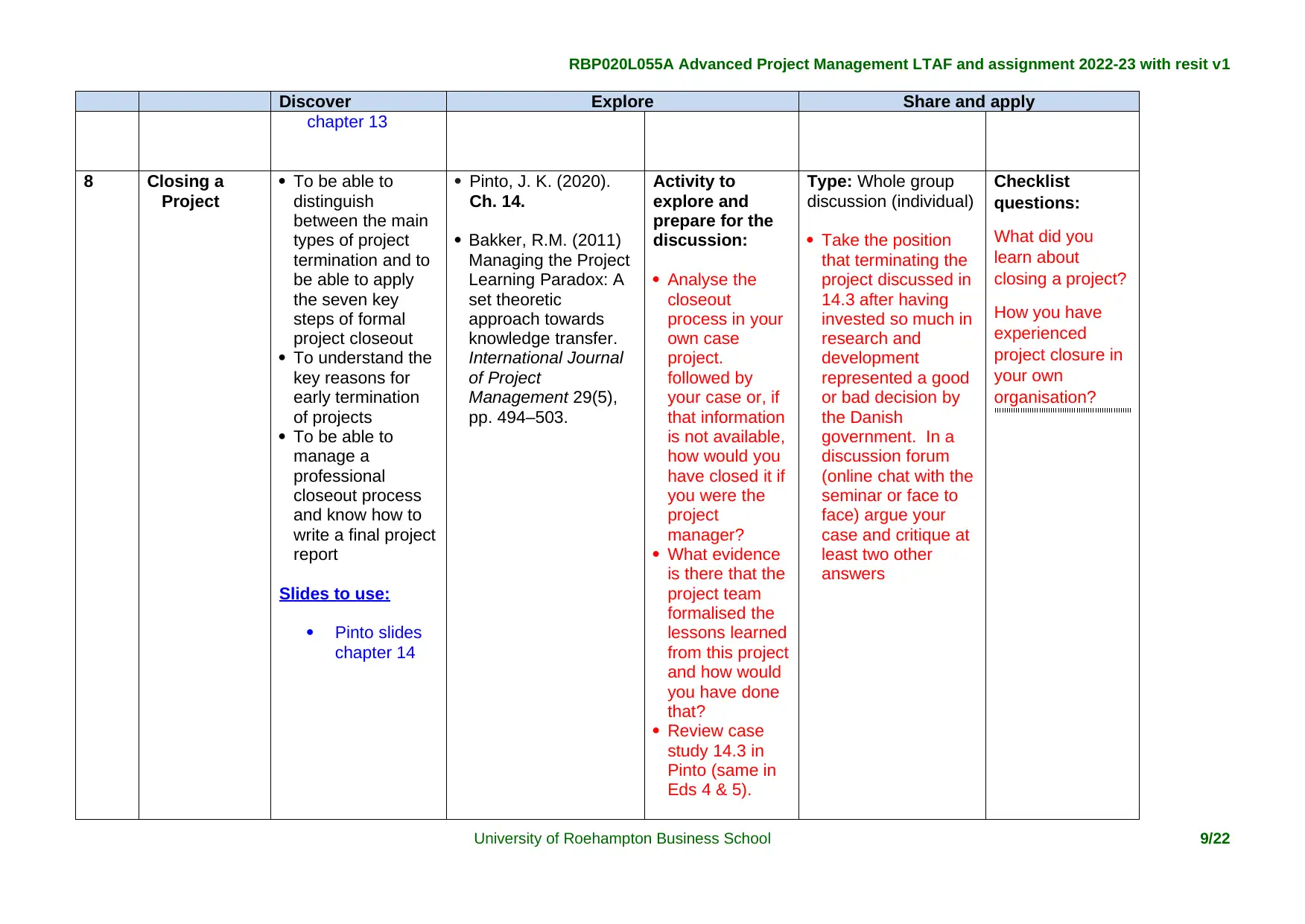
RBP020L055A Advanced Project Management LTAF and assignment 2022-23 with resit v1
Discover Explore Share and apply
chapter 13
8 Closing a
Project
To be able to
distinguish
between the main
types of project
termination and to
be able to apply
the seven key
steps of formal
project closeout
To understand the
key reasons for
early termination
of projects
To be able to
manage a
professional
closeout process
and know how to
write a final project
report
Slides to use:
Pinto slides
chapter 14
Pinto, J. K. (2020).
Ch. 14.
Bakker, R.M. (2011)
Managing the Project
Learning Paradox: A
set theoretic
approach towards
knowledge transfer.
International Journal
of Project
Management 29(5),
pp. 494–503.
Activity to
explore and
prepare for the
discussion:
Analyse the
closeout
process in your
own case
project.
followed by
your case or, if
that information
is not available,
how would you
have closed it if
you were the
project
manager?
What evidence
is there that the
project team
formalised the
lessons learned
from this project
and how would
you have done
that?
Review case
study 14.3 in
Pinto (same in
Eds 4 & 5).
Type: Whole group
discussion (individual)
Take the position
that terminating the
project discussed in
14.3 after having
invested so much in
research and
development
represented a good
or bad decision by
the Danish
government. In a
discussion forum
(online chat with the
seminar or face to
face) argue your
case and critique at
least two other
answers
Checklist
questions:
What did you
learn about
closing a project?
How you have
experienced
project closure in
your own
organisation?
University of Roehampton Business School 9/22
Discover Explore Share and apply
chapter 13
8 Closing a
Project
To be able to
distinguish
between the main
types of project
termination and to
be able to apply
the seven key
steps of formal
project closeout
To understand the
key reasons for
early termination
of projects
To be able to
manage a
professional
closeout process
and know how to
write a final project
report
Slides to use:
Pinto slides
chapter 14
Pinto, J. K. (2020).
Ch. 14.
Bakker, R.M. (2011)
Managing the Project
Learning Paradox: A
set theoretic
approach towards
knowledge transfer.
International Journal
of Project
Management 29(5),
pp. 494–503.
Activity to
explore and
prepare for the
discussion:
Analyse the
closeout
process in your
own case
project.
followed by
your case or, if
that information
is not available,
how would you
have closed it if
you were the
project
manager?
What evidence
is there that the
project team
formalised the
lessons learned
from this project
and how would
you have done
that?
Review case
study 14.3 in
Pinto (same in
Eds 4 & 5).
Type: Whole group
discussion (individual)
Take the position
that terminating the
project discussed in
14.3 after having
invested so much in
research and
development
represented a good
or bad decision by
the Danish
government. In a
discussion forum
(online chat with the
seminar or face to
face) argue your
case and critique at
least two other
answers
Checklist
questions:
What did you
learn about
closing a project?
How you have
experienced
project closure in
your own
organisation?
University of Roehampton Business School 9/22
⊘ This is a preview!⊘
Do you want full access?
Subscribe today to unlock all pages.

Trusted by 1+ million students worldwide
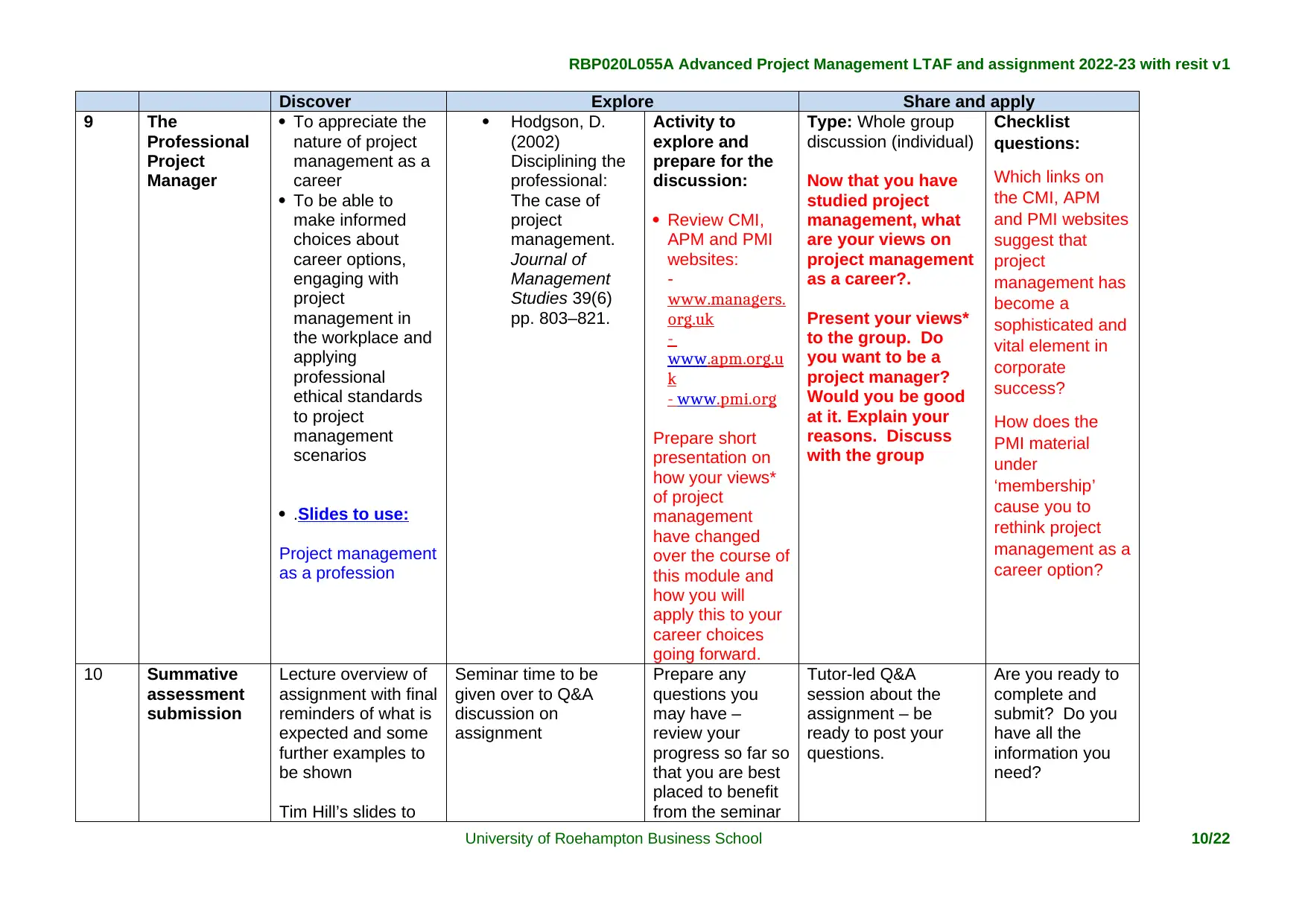
RBP020L055A Advanced Project Management LTAF and assignment 2022-23 with resit v1
Discover Explore Share and apply
9 The
Professional
Project
Manager
To appreciate the
nature of project
management as a
career
To be able to
make informed
choices about
career options,
engaging with
project
management in
the workplace and
applying
professional
ethical standards
to project
management
scenarios
.Slides to use:
Project management
as a profession
Hodgson, D.
(2002)
Disciplining the
professional:
The case of
project
management.
Journal of
Management
Studies 39(6)
pp. 803–821.
Activity to
explore and
prepare for the
discussion:
Review CMI,
APM and PMI
websites:
-
www.managers.
org.uk
-
www.apm.org.u
k
- www.pmi.org
Prepare short
presentation on
how your views*
of project
management
have changed
over the course of
this module and
how you will
apply this to your
career choices
going forward.
Type: Whole group
discussion (individual)
Now that you have
studied project
management, what
are your views on
project management
as a career?.
Present your views*
to the group. Do
you want to be a
project manager?
Would you be good
at it. Explain your
reasons. Discuss
with the group
Checklist
questions:
Which links on
the CMI, APM
and PMI websites
suggest that
project
management has
become a
sophisticated and
vital element in
corporate
success?
How does the
PMI material
under
‘membership’
cause you to
rethink project
management as a
career option?
10 Summative
assessment
submission
Lecture overview of
assignment with final
reminders of what is
expected and some
further examples to
be shown
Tim Hill’s slides to
Seminar time to be
given over to Q&A
discussion on
assignment
Prepare any
questions you
may have –
review your
progress so far so
that you are best
placed to benefit
from the seminar
Tutor-led Q&A
session about the
assignment – be
ready to post your
questions.
Are you ready to
complete and
submit? Do you
have all the
information you
need?
University of Roehampton Business School 10/22
Discover Explore Share and apply
9 The
Professional
Project
Manager
To appreciate the
nature of project
management as a
career
To be able to
make informed
choices about
career options,
engaging with
project
management in
the workplace and
applying
professional
ethical standards
to project
management
scenarios
.Slides to use:
Project management
as a profession
Hodgson, D.
(2002)
Disciplining the
professional:
The case of
project
management.
Journal of
Management
Studies 39(6)
pp. 803–821.
Activity to
explore and
prepare for the
discussion:
Review CMI,
APM and PMI
websites:
-
www.managers.
org.uk
-
www.apm.org.u
k
- www.pmi.org
Prepare short
presentation on
how your views*
of project
management
have changed
over the course of
this module and
how you will
apply this to your
career choices
going forward.
Type: Whole group
discussion (individual)
Now that you have
studied project
management, what
are your views on
project management
as a career?.
Present your views*
to the group. Do
you want to be a
project manager?
Would you be good
at it. Explain your
reasons. Discuss
with the group
Checklist
questions:
Which links on
the CMI, APM
and PMI websites
suggest that
project
management has
become a
sophisticated and
vital element in
corporate
success?
How does the
PMI material
under
‘membership’
cause you to
rethink project
management as a
career option?
10 Summative
assessment
submission
Lecture overview of
assignment with final
reminders of what is
expected and some
further examples to
be shown
Tim Hill’s slides to
Seminar time to be
given over to Q&A
discussion on
assignment
Prepare any
questions you
may have –
review your
progress so far so
that you are best
placed to benefit
from the seminar
Tutor-led Q&A
session about the
assignment – be
ready to post your
questions.
Are you ready to
complete and
submit? Do you
have all the
information you
need?
University of Roehampton Business School 10/22
Paraphrase This Document
Need a fresh take? Get an instant paraphrase of this document with our AI Paraphraser
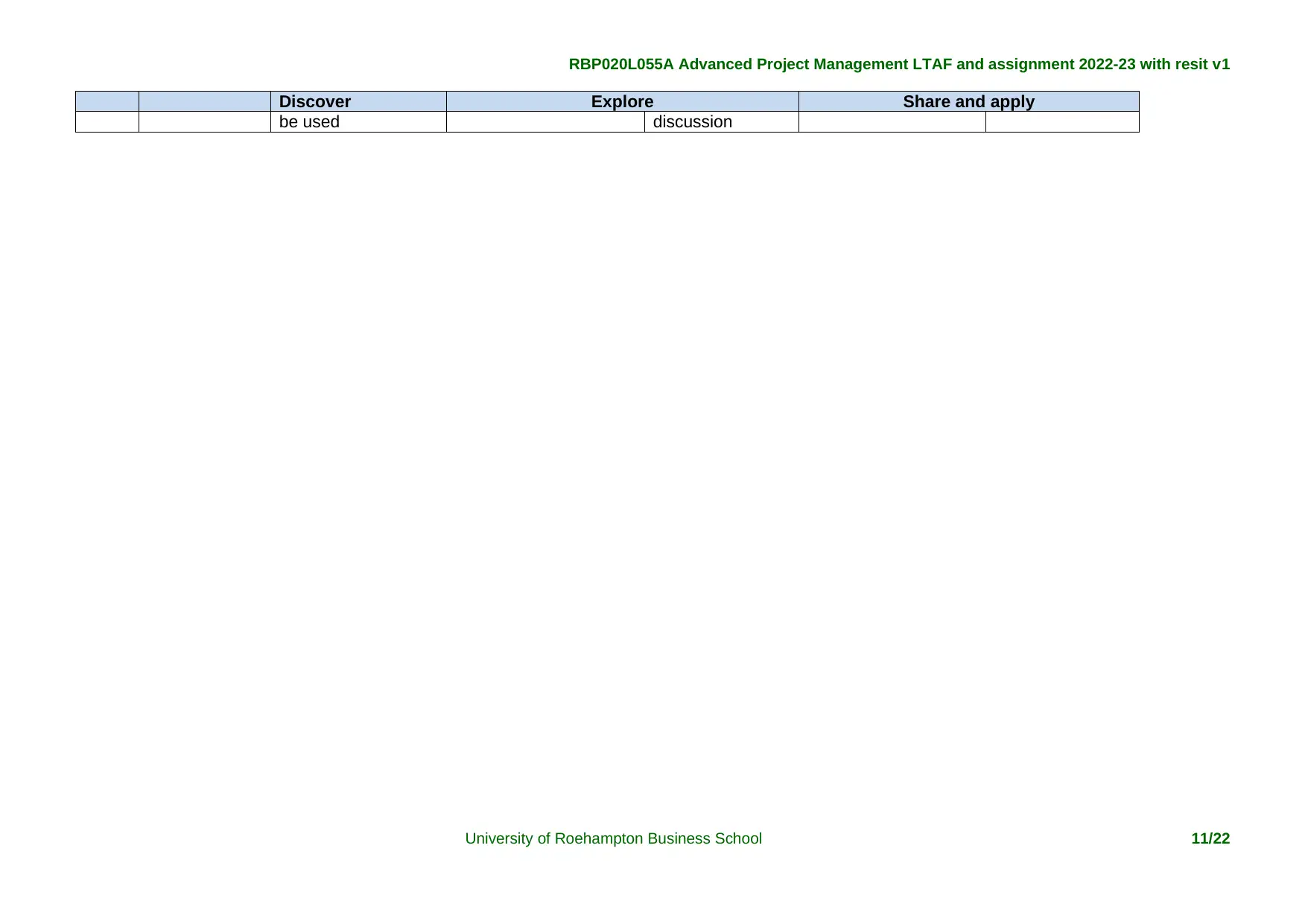
RBP020L055A Advanced Project Management LTAF and assignment 2022-23 with resit v1
Discover Explore Share and apply
be used discussion
University of Roehampton Business School 11/22
Discover Explore Share and apply
be used discussion
University of Roehampton Business School 11/22
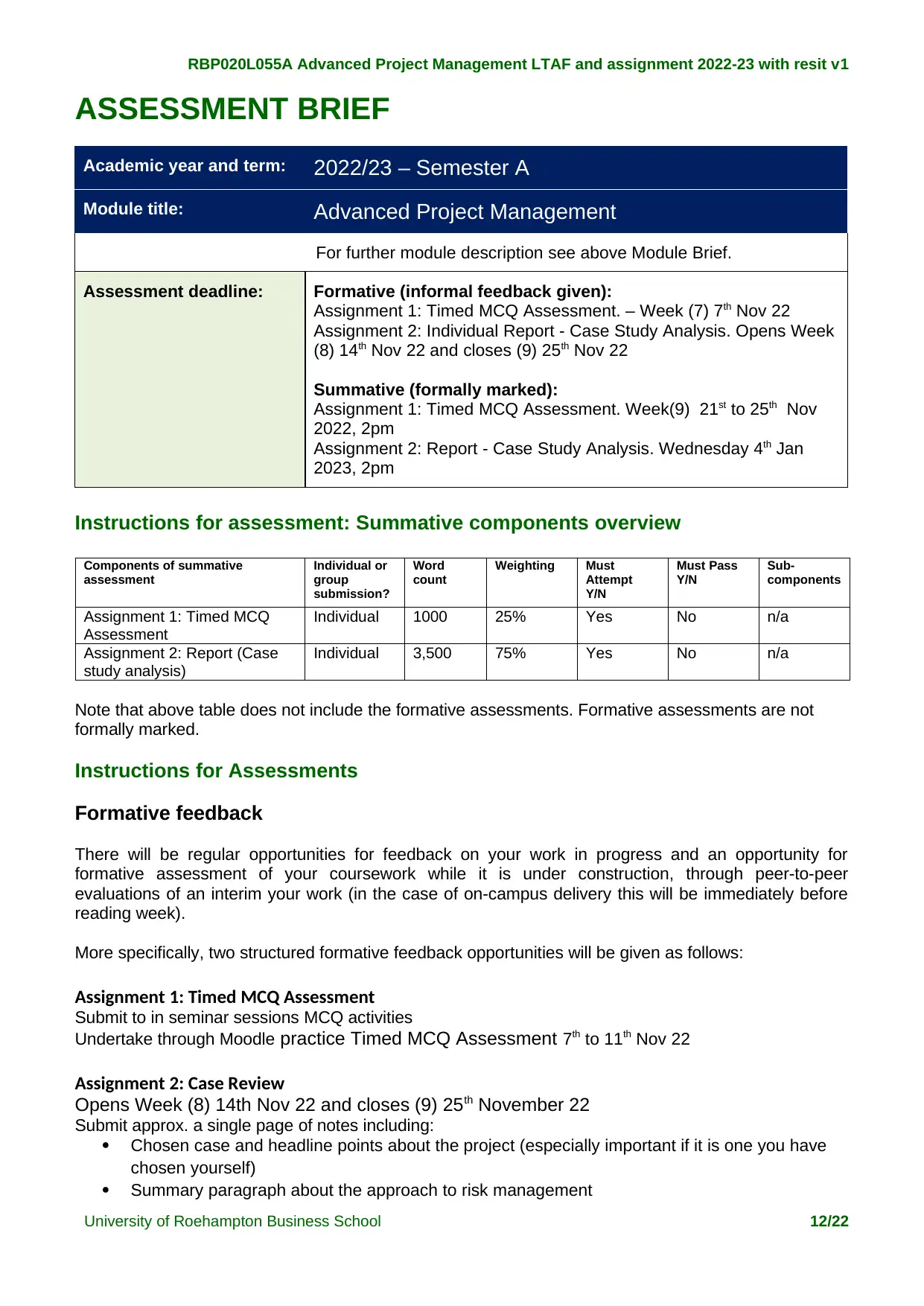
RBP020L055A Advanced Project Management LTAF and assignment 2022-23 with resit v1
ASSESSMENT BRIEF
Academic year and term: 2022/23 – Semester A
Module title: Advanced Project Management
For further module description see above Module Brief.
Assessment deadline: Formative (informal feedback given):
Assignment 1: Timed MCQ Assessment. – Week (7) 7th Nov 22
Assignment 2: Individual Report - Case Study Analysis. Opens Week
(8) 14th Nov 22 and closes (9) 25th Nov 22
Summative (formally marked):
Assignment 1: Timed MCQ Assessment. Week(9) 21st to 25th Nov
2022, 2pm
Assignment 2: Report - Case Study Analysis. Wednesday 4th Jan
2023, 2pm
Instructions for assessment: Summative components overview
Components of summative
assessment
Individual or
group
submission?
Word
count
Weighting Must
Attempt
Y/N
Must Pass
Y/N
Sub-
components
Assignment 1: Timed MCQ
Assessment
Individual 1000 25% Yes No n/a
Assignment 2: Report (Case
study analysis)
Individual 3,500 75% Yes No n/a
Note that above table does not include the formative assessments. Formative assessments are not
formally marked.
Instructions for Assessments
Formative feedback
There will be regular opportunities for feedback on your work in progress and an opportunity for
formative assessment of your coursework while it is under construction, through peer-to-peer
evaluations of an interim your work (in the case of on-campus delivery this will be immediately before
reading week).
More specifically, two structured formative feedback opportunities will be given as follows:
Assignment 1: Timed MCQ Assessment
Submit to in seminar sessions MCQ activities
Undertake through Moodle practice Timed MCQ Assessment 7th to 11th Nov 22
Assignment 2: Case Review
Opens Week (8) 14th Nov 22 and closes (9) 25th November 22
Submit approx. a single page of notes including:
Chosen case and headline points about the project (especially important if it is one you have
chosen yourself)
Summary paragraph about the approach to risk management
University of Roehampton Business School 12/22
ASSESSMENT BRIEF
Academic year and term: 2022/23 – Semester A
Module title: Advanced Project Management
For further module description see above Module Brief.
Assessment deadline: Formative (informal feedback given):
Assignment 1: Timed MCQ Assessment. – Week (7) 7th Nov 22
Assignment 2: Individual Report - Case Study Analysis. Opens Week
(8) 14th Nov 22 and closes (9) 25th Nov 22
Summative (formally marked):
Assignment 1: Timed MCQ Assessment. Week(9) 21st to 25th Nov
2022, 2pm
Assignment 2: Report - Case Study Analysis. Wednesday 4th Jan
2023, 2pm
Instructions for assessment: Summative components overview
Components of summative
assessment
Individual or
group
submission?
Word
count
Weighting Must
Attempt
Y/N
Must Pass
Y/N
Sub-
components
Assignment 1: Timed MCQ
Assessment
Individual 1000 25% Yes No n/a
Assignment 2: Report (Case
study analysis)
Individual 3,500 75% Yes No n/a
Note that above table does not include the formative assessments. Formative assessments are not
formally marked.
Instructions for Assessments
Formative feedback
There will be regular opportunities for feedback on your work in progress and an opportunity for
formative assessment of your coursework while it is under construction, through peer-to-peer
evaluations of an interim your work (in the case of on-campus delivery this will be immediately before
reading week).
More specifically, two structured formative feedback opportunities will be given as follows:
Assignment 1: Timed MCQ Assessment
Submit to in seminar sessions MCQ activities
Undertake through Moodle practice Timed MCQ Assessment 7th to 11th Nov 22
Assignment 2: Case Review
Opens Week (8) 14th Nov 22 and closes (9) 25th November 22
Submit approx. a single page of notes including:
Chosen case and headline points about the project (especially important if it is one you have
chosen yourself)
Summary paragraph about the approach to risk management
University of Roehampton Business School 12/22
⊘ This is a preview!⊘
Do you want full access?
Subscribe today to unlock all pages.

Trusted by 1+ million students worldwide
1 out of 22
Related Documents
Your All-in-One AI-Powered Toolkit for Academic Success.
+13062052269
info@desklib.com
Available 24*7 on WhatsApp / Email
![[object Object]](/_next/static/media/star-bottom.7253800d.svg)
Unlock your academic potential
Copyright © 2020–2026 A2Z Services. All Rights Reserved. Developed and managed by ZUCOL.



